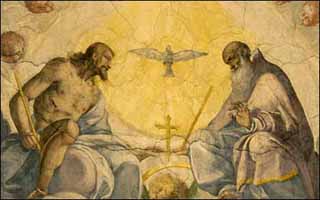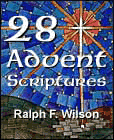
|
Old Testament
New Testament
Gospels
Acts
Paul's Letters
General Letters
Revelation
Topical Studies
Beginning the Journey (for new Christians). en Español

|
Old Testament
New Testament
Gospels
Acts
Paul's Letters
General Letters
Revelation
Topical Studies

|
Home
Bible Studies
Articles
Books
Podcasts
Search
Menu
Donate
About Us
Contact Us
FAQ
Sitemap
Day 25. The Everlasting Kingdom of the Son of Man (Daniel 7:13-14)
Wednesday (following the Fourth Sunday in Advent)
 Gian Domenico Caresana, detail 'Holy Trinity' (1616), ceiling fresco, Church Chiesa di Sant'Orsola, Como, Italy. |
Read in your Bible: Daniel 7:9-14
Daniel has a vision of heaven that has a lot to do with Jesus' ministry on earth as well as his future in the Last Days.
One Like a Son of Man (Daniel 7:13a)
"In my vision at night I looked,
and there before me was one like a son of man...." (Daniel 7:13a)
In the Old Testament the term "son of man" is an Hebraic way of saying "human being." It occurs 107 times in the Hebrew Bible (for example Ezekiel 2:1; Psalm 8:4; Daniel 8:17). In our passage, Daniel is saying that he sees someone in his vision who looks human.
As we study the first three Gospels especially we see Jesus using "Son of Man" as a title. The title was ambiguous in his day -- not nearly as clear, politically volatile, and polarizing to the Jews of his day as the title "Messiah."
As we study Daniel's prophecy we begin to see that it is actually a title full of divinity and glory and power. By taking the title "Son of Man," Jesus is saying, "I am the Son of Man spoken of in Daniel's prophecy!" And he confirms this in his trial before the Sanhedrin (Matthew 26:64).
Coming with the Clouds of Heaven (Daniel 7:13b)
Let's look more closely.
"In my vision at night I looked,
and there before me was one like a son of man,
coming with the clouds of heaven." (Daniel 7:13b)
The Son of Man "comes with the clouds of heaven." A number of Old Testament passages see God as "riding on the clouds." No one else in the Bible but Yahweh himself "comes with the clouds."199 This is an earmark of divinity! Later, Jesus mentions "coming on the clouds" as a sign of his own Second Coming, nearly always using the title "Son of Man."200
Ancient of Days Grants Authority, Glory, and Sovereign Power (Daniel 7:13c-14a)
"He approached the Ancient of Days and was led into his presence. He was given authority201, glory202 and sovereign power.203" (Daniel 7:13c-14a)
"Ancient of Days,"204 of course, is a title for Yahweh, King of the Universe, seated in his throne room, surrounded by myriad attendants, books open, ready to render judgment -- the Eternal God (Daniel 7:9; cf. Isaiah 6:1-3).
Now the Most High God, Yahweh himself, the holder of all authority, glory, and sovereign power, gives these very prerogatives of divinity to "one like a son of man." Jesus, the Son of Man, is himself the recipient -- the glorious King of the Kingdom of God. Jesus claims this:
"All authority in heaven and on earth has been given to me. Therefore go and make disciples of all nations...." (Matthew 28:18b-19a)
All Peoples Worshiped Him (Daniel 7:14b)
Not only does Yahweh acknowledge him as divine king, so do the peoples of the world according to this vision.
"All peoples, nations and men of every
language worshiped205
him.
His dominion is an everlasting dominion that will not pass away,
and his kingdom is one that will never be destroyed." (Daniel 7:14b)
This looks forward to the day that Paul foresees, when:
"... Every knee should bow,
in heaven and on earth and under the earth,
and every tongue confess that Jesus Christ is Lord,
to the glory of God the Father." (Philippians 2:10b-11)
When you read the Book of Daniel, you see great world powers rise and fall; their end is destruction. However, the dominion206 or kingdom207 given to "one like a son of man" is different. It is:
Other kingdoms, even great empires, meet destruction before the next great empire. But this kingdom, the final kingdom, is the great rock that destroys them all and will never itself be destroyed. It is the kingdom prophesied in Daniel:
"In the time of those kings, the God of heaven will set up a kingdom that will never be destroyed, nor will it be left to another people. It will crush all those kingdoms and bring them to an end, but it will itself endure forever." (Daniel 2:44)
Beginnings
This Kingdom is alluded to in Bethlehem where the angel proclaims:
"Today in the town of David a Savior has been
born to you;
he is Christ the Lord." (Luke 2:11)
 Also available in book formats: PDF, Kindle, and paperback. |
But the Kingdom didn't begin in Bethlehem. It began in the mind of the Father before the beginning of time. As he forms the children of Israel in the wilderness, he reveals himself as King of Israel. It progresses as Saul and then David are proclaimed King of God's people. In Jesus is found the promised Messiah, the Anointed One, descended from David, who will deliver his people, the Son of Man of Daniel's vision. And finally, Christ will reign over this unshakable Kingdom forever and ever. All this wonderful plan of God is fulfilled in the Child lying in a manger in a stable in Bethlehem. As the songwriter put it:
"The hopes and fears of all the years
Are met in thee tonight."211
Prayer
Jesus, King, heavenly Son of Man we exalt and praise you. We bow before you and acknowledge you as having all authority, dominion, and power. You are King of kings, and Lord of all so-called lords. You reign! Hallelujah! Let us serve you as behooves the service of a king. In your mighty name, we pray. Amen!
Discussion Question
Q25. (Daniel 7:13-14) What does the Ancient of Days
grant to the Son of Man? Why do you think Jesus used the title of "Son of Man"
even though most didn't understand its importance? What does Jesus' authority
mean to you and your life?
https://www.joyfulheart.com/forums/topic/2100-q25-son-of-man/
Endnotes
[199] Psalm 68:4; 104:3b; Isaiah 19:1a. As Longman puts it, "he is riding the cloud chariot, which is the prerogative of God alone" (Tremper Longman III, The NIV Application Commentary: Daniel (Zondervan, 1999), in loc.) He notes that in literature from Ugarit. Baal, the chief deity and primary divine warrior of that culture, is often called the "Rider on the Clouds."
[200] Matthew 24:30b; Mark 13:26; cf. Luke 21:27; Matthew 26:64; Mark 14:62; Revelation 1:7a; 14:14a.
[201] "Authority" (NIV), "dominion" (NRSV, ESV, KJV) is sholṭān, "dominion, sovereignty," usually of God. From shelēṭ, "have power, rule" (BDB), "dominion, lordship" (Holladay, p. 423).
[202] "Glory" is yeqār, "honor," from the root "to be precious" (BDB).
[203] "Sovereign power" (NIV), "kingship" (NRSV), "kingdom" (ESV, KJV) is malkû, "royalty, kingship, kingly authority" (BDB), "royalty, reign, kingdom" (TWOT #2929c), "kingship, sovereignty," similar to "kingdom, realm" (Holladay, p. 411).
[204] "Ancient" is the adjective ʿattîq, "advanced, aged" (BDB). Derivatives of the Hebrew root include the ideas of value and eminence, "old, aged" (Holladay, p. 417). "Days" is yôm, "day" (TWOT #2762).
[205] Pelaḥ, BDB. "Worshiped" (NIV), "should serve" (NRSV, ESV, KJV) is pelaḥ, "pay reverence to, serve" (BDB).
[206] "Dominion" is sholṭān, which we saw in 7:13, "dominion, sovereignty," usually of God. From shelēṭ, "have power, rule" (BDB), "dominion, lordship" (Holladay, p. 423).
[207] "Kingdom" is malkû, which we saw in verse 13 and 14a: "royalty, reign, kingdom" (BDB), "kingship, sovereignty," similar to "kingdom, realm" (Holladay, p. 411).
[208] "Everlasting" is ʿālam, "perpetuity, antiquity" (BDB), "remote time, eternity" (Holladay, p. 416).
[209] "Pass away" is ʿădâʾ, "pass away" (BDB), "go away, vanish" (Holladay, p. 415).
[210] "Destroyed" is the Hithpael stem of ḥabal, "be destroyed," see also 2:44 and 6:26 (BDB), "be destroyed, perish" (Holladay, p. 405).
[211] "O Little Town of Bethlehem" (1867), words: Phillips Brooks.
Copyright © 2026, Ralph F. Wilson. <pastor![]() joyfulheart.com> All rights reserved. A single copy of this article is free. Do not put this on a website. See legal, copyright, and reprint information.
joyfulheart.com> All rights reserved. A single copy of this article is free. Do not put this on a website. See legal, copyright, and reprint information.

